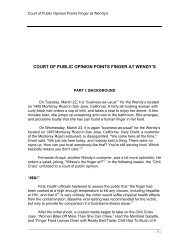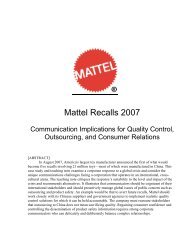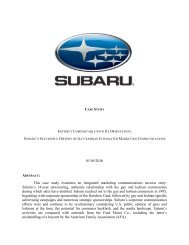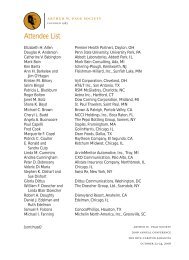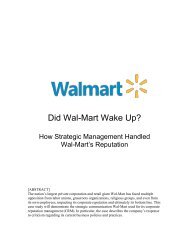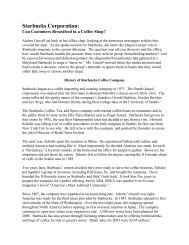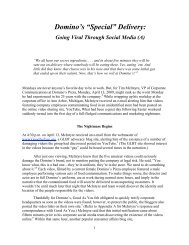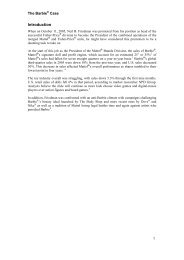The Barbie Case - The Arthur Page Society
The Barbie Case - The Arthur Page Society
The Barbie Case - The Arthur Page Society
You also want an ePaper? Increase the reach of your titles
YUMPU automatically turns print PDFs into web optimized ePapers that Google loves.
Arguments can be made on both sides of the issue. <strong>The</strong> quick<br />
accessibility of information on the Internet in many cases has<br />
allowed for an easier and more efficient lifestyle. Businesses<br />
that track our buying behavior are more capable of pointing<br />
us in the direction of other items we may want and often<br />
offer us discounts on frequently purchased products. And as<br />
more records are put online by government the faster we can<br />
get a hold of duplicate records such as birth certificates and<br />
voter registration cards when we need them. Companies like<br />
ChoicePoint have provided many benefits to society as they<br />
have actively participated in finding many abducted children,<br />
have helped track down numerous deadbeat dads, and have<br />
provided information to law enforcement agencies that has<br />
led to the arrest of criminals. 21<br />
On the other hand, privacy advocacy groups such as Privacy<br />
Rights Clearinghouse point out that this enhanced<br />
accessibility to personal information makes us vulnerable to<br />
not only identity theft but also incorrect data profiles. One of<br />
the biggest problems with aggregating information from a<br />
variety of sources is errors and omissions in the data. <strong>The</strong>se<br />
mistakes and holes in someone’s profile create opportunity<br />
for misunderstandings between the party using the<br />
information and the individual that is portrayed. This can<br />
especially be a problem when the incorrect profiles are used<br />
in the hiring and credit granting decisions, as the individual<br />
does not get a chance to review their information. Privacy<br />
Rights Clearinghouse quotes <strong>The</strong> Unwanted Gaze: <strong>The</strong><br />
Destruction of Privacy in America by Jeffrey Rosen.<br />
“Privacy protects us from being misdefined and judged<br />
out of context in a world of short attention spans, a<br />
world in which information can easily be confused with<br />
knowledge.” 22<br />
One thing known for sure is that personal information that<br />
gets into the hands of the wrong people can prove harmful to<br />
both our pocket books and our reputations. Identity theft is<br />
one of the fastest growing crimes in the United States.<br />
According to a Federal Bureau of Investigation report, in<br />
upwards of 900,000 people are victims of credit theft in this<br />
nation each year. 23 At an average cost of $1,000 for victims to<br />
repair the destruction done by identity theft, this delinquency<br />
is costly to the individual and at an average cost to financial<br />
institutions of $6,767 per crime, it puts a toll on the<br />
economy. 24 To make matters worse, a survey done by <strong>The</strong><br />
Privacy Rights Clearinghouse showed that 12% of identity<br />
theft victims suffered damage done to their good names and<br />
were left with unjust criminal records due to the thieves’<br />
activity. 25<br />
arthur w. page society<br />
ChoicePoint’s Actions<br />
A public announcement by ChoicePoint is inevitable. With<br />
the arrest of one of the identity thieves, the LASD’s<br />
investigations will begin to wrap up soon. Whether<br />
instructions were to start disclosing the security breach in<br />
November or January, it remains clear that at some point<br />
ChoicePoint will have to go public with the problem. How<br />
should ChoicePoint come out with the information? Should<br />
ChoicePoint inform only those Californians that may be<br />
affected by the breach? Which individuals or groups should<br />
ChoicePoint be concerned with as they make the<br />
announcement? What changes, if any, should ChoicePoint<br />
make in the future? As they get closer and closer to the public<br />
announcement, these questions and more will have to be<br />
answered by James Lee and the communications team at<br />
ChoicePoint.<br />
Public Disclosure, Finally<br />
On February 14, 2005, ChoicePoint, Inc., the Alpharetta, Ga.based<br />
data collection giant who suffered a security breach in<br />
late September of 2004, finally disclosed the problem to the<br />
public. As letters were sent out, by law, to the 35,000<br />
California residents who were potential victims of identity<br />
theft, ChoicePoint made the internal decision to also send<br />
letters of notification to 110,000 additional Americans who<br />
were potential victims. Of the 145,000 potential victims,<br />
authorities were certain that at least 750 had become victims<br />
of identity theft. 26 ChoicePoint was not required by law to<br />
notify the potential victims in the other 49 states, but it made<br />
the internal decision to do so because ChoicePoint knew that<br />
the moment the California letters were sent out the spotlight<br />
was going to turn quickly and brightly to every aspect of their<br />
operations for the foreseeable future. And ChoicePoint was<br />
right. Public disgust, media fire, and, as a result of the two,<br />
heat from legislators are now just a few of the very difficult<br />
obstacles facing ChoicePoint as the debate over privacy<br />
becomes a central issue in American society and American<br />
politics.<br />
What Went Wrong Inside ChoicePoint<br />
More than fifty phony businesses were created by identity<br />
thefts to exploit ChoicePoint’s systems and commit identity<br />
theft. Posing as legitimate insurance agencies, check-cashing<br />
companies, and other outfits that would have normally been<br />
allowed to subscribe to ChoicePoint’s services, the identity<br />
thefts gained access to the 19 billion data files that<br />
ChoicePoint has complied in its databases. 27 Once inside a<br />
thief has access to seemingly endless amounts of personal<br />
information on nearly every American adult. Current and<br />
former addresses, credit information, employment history,<br />
31



